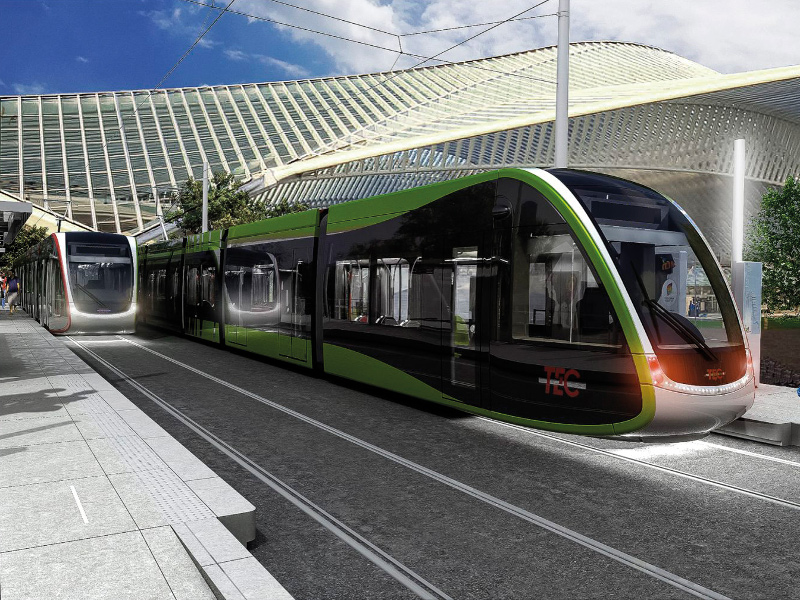Tram de Liège: Making the tram (project) run on time
Posted 17/04/2019 by Jerome Santos

In September 2018 Tram’Ardent was chosen by the city of Liege in Belgium to design, build, finance and maintain the project under a 30-year PPP contract. A multi-faceted scheme involving significant construction work in a complex urban environment, it entailed a delicate political process comprising many stakeholders. To help the lenders understand the risks and mitigation measures involved in these challenges, the consortium turned to Infrata.
The Belgian city of Liege is getting an upgrade. This industrialised centre in the Walloon region is about to start work on its first tram project, which will link the various development centres of the city.
So why trams? And why now?
Well, Liege is a fast-growing area, but its population depends heavily on private cars and public bus services. The city's administrators have long wanted to provide a more scalable alternative. They also want to adhere to growing environmental and sustainability demands.
In fact, the Liege tram scheme already had one 'false start'. In December 2014, the Société Régionale Wallonne du Transport (SRWT) selected a consortium to finance and build a line linking Sclessin and Bressoux via the city centre.
However, work on the project was suspended in March 2015, after the EU statistical office questioned the financial structure of agreement.
So, the city tried again. The Opérateur de Transport de Wallonie (OTW, ex-SRWT) invited new tenders, and eventually selected in September 2018 Tram’Ardent as preferred bidder to design, build, finance and maintain the project under a 30-year PPP contract. The project successfully reached financial close in January 2019.
Tram’Ardent comprises DIF Infrastructure V, French construction firm COLAS through its Major Projects, Rail and Belgian branches, and Spanish rolling stock manufacturer and rail system integrator Construcciones y Auxiliar de Ferrocarriles (CAF). The design and construction is estimated to cost €430m, which is financed by Natixis, AG Insurance, Belfius, BBVA, Talanx and the European Investment Bank backed by the European Fund for Strategic Investments (EFSI).
Work on the 11.7 km line is due to begin in May 2019, with completion set for October 2022. But this is not just a tram project. It is a major urban development scheme that will provide park and ride facilities, bike paths, bus lanes and pedestrian footways.
This will help Liege to achieve the Zero Carbon Administrative City target set for 2022.
Tram de Liège is a multi-faceted scheme that raises many technical issues. Dennis Jong, director at DIF, explains why. "This is a landmark project in many ways,” he says. “It involves significant construction work to existing infrastructure in a complex urban environment. There's a delicate political process comprising many stakeholders: the city, the Walloon region, and the public transport authority, including the bus and tram operator."
To help the lenders understand the risks and mitigation measures involved in these challenges, the consortium hired Infrata to serve as lenders’ technical advisor.
Infrata examined crucial issues such as:
- The innovative use of battery-powered trams that will run through the historic city centre without any catenary wires – especially with respect to the performance and autonomy of the batteries
- The risk involved in procuring rolling stock adapted to the specific needs of the OTW
- Widening a post World War 2 bridge crossing – designed for cars – to support trams
- Replacing a bridge over a live existing railway
- Diverting utility works in busy city centre areas on a limited timeline
- Interfacing with a large number of utility owners
- Projecting possible financial penalties imposed by the OTW in the event of failing to meet agreed requirements
- Phasing construction work to minimise disruption to the city during important events such as the annual folk festival and Christmas market
- The impact of the tram mileage variations on the maintenance programme
Jong says the Infrata team provided excellent insight, not just in its recommendations but also in how it presented them. "Infrata stands out in the way its reports are risk-based and to the point," he says.
"Both lenders and sponsors need to come to grips with complex technical matters and design choices in an efficient way. Infrata's concise reports facilitate just that."
Jong also found Infrata's professionalism revealed itself in face to face meetings. "The Infrata team contributed to the success of the project during the lenders’ meetings in particular. They reduced risks and mitigation measures to their essence. That really helped to address the needs of the lenders,” he says.
Other consortium members relied on Infrata's input too. Lisa Garcia, project manager at Colas, says: “Infrata had a good understanding of the project features. They studied the project’s risks and mitigation measures, and were able to give clear insights to the both consortium and lenders. The Infrata team was closely involved throughout and always available.”
Although Tram de Liège is a complex project with multiple stakeholders, the due diligence process closed as planned on 22 January 2019. Dennis Jong says Infrata's willingness to work long hours helped to make this happen.
"The team was available at all times, especially at the height of processes," he says. "During that period, they went over and above with the time they put in. This definitely contributed to the successful closing of the Tram de Liège project."